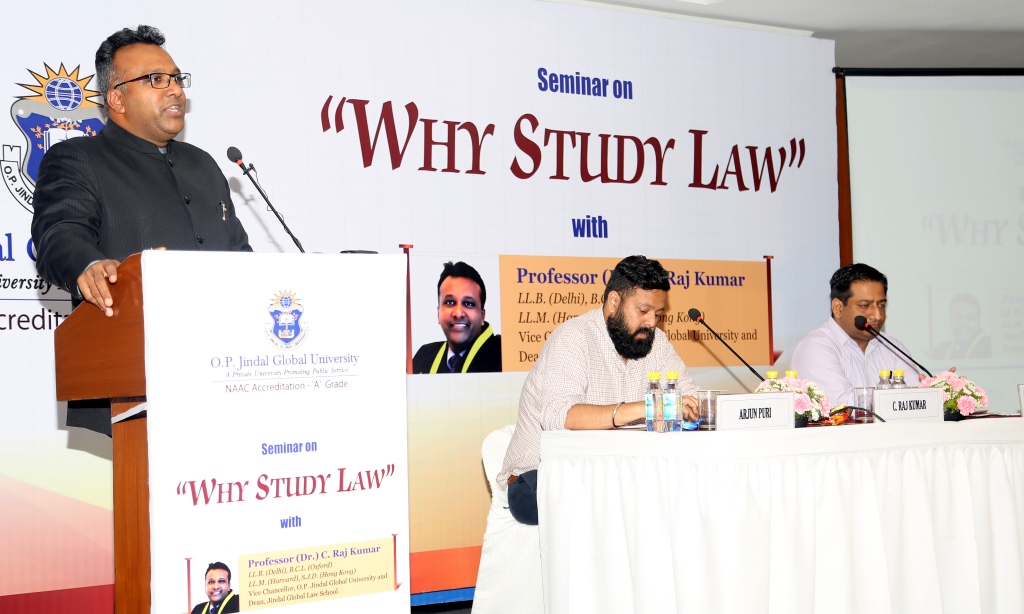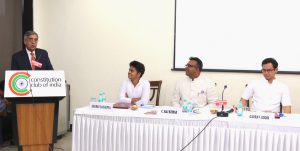New Delhi, Delhi, India:
- Knowledge of law provides the foundation to understand society; Prof C Raj Kumar
- Seminar discusses emerging opportunities and interesting career options in the field of Law
- As the democratic institutions of India evolve, the country will gradually transition towards becoming a rule of law society; Vice Chancellor, JGU
Most students hold the misconception that studying law is synonymous with cramming statutes and penal codes and offers little interest for people who do not want to make their careers as lawyers. However, for students who want to study humanities and develop critical thinking in the field, studying law can open their vision to much deeper and wider understanding.
NCR based O. P. Jindal University today organized a seminar in the national capital led by the Vice Chancellor Prof (Dr) C Raj Kumar who is also the Dean of the Jindal Global Law School. Talking on the pertinent question ‘Why Study Law’, Prof Kumar enlightened the attending students about various perspectives of law education and the deep intellectual understanding it can bestow on students.
Prof Kumar also spoke about the evolution of legal education in India and the multiple career options that students can pursue after studying the subject. He said the changing nature of the economy and society in the past two decades has enabled enormous diversification in the legal profession, which in turn has opened up a tremendous range of opportunities for students studying law.
“Last two decades have seen enormous diversification of the legal profession. Most lawyers or law graduates today from the leading law schools actually do not enter into litigation practice. Instead, they are pursuing a diverse range of options and opportunities that are available for them now, such as working for corporate law firms, trade and investment areas, non-governmental/inter-governmental organizations, human rights organizations, think tanks, research institutions, legal process outsourcing (LPOs), working as in-house counsel in companies and corporations both domestic and international. This has opened a range of possibilities for one to take up the study of law. Law helps you to challenge your thought process, develop analytical skills and negotiate better and actually work for the common interest of the society. Knowledge of law provides the foundation to understand the society,” said Prof Kumar.
The seminar was attended by a large number of young students, many of whom are contemplating different career options to suit their aptitude and intellectual strengths.
“Earlier in 80’s, law was not considered an important career option. However, times have changed now in our country for better. I strongly believe that the law and the study of law is to become most prominent and important not only as a discipline, but also as a career aspiration for young people because India is increasingly becoming a rule of law society, at least there is strong aspiration to establish a rule of law society. Secondly, we also believe that democratic institutions of India are evolving in a more responsible manner. Increasingly, law and justice will shape the nature of democratic governance that we are aspiring to achieve,” he added.
He said studying law not only trains you into becoming a lawyer but gives you the intellectual strength and problem solving capacity to excel in any career you take, be it public service, administration, academics, research, business enterprise or politics.
It is important to examine your aptitude before entering into this domain of study. One must not study law just because his/her parents were in the field or the profession looks attractive and glamorous.
The attending students also interacted with Prof Kumar and asked a number of questions and sought to clear their doubts and apprehensions about the subject.
Law is a wide and interesting field of study which not only trains students in interpreting statutes but provides them a deep perspective into the evolution of human race into civilizations governed by laws.
Studying the subject can equip students to pursue further studies in international relations, business studies, public policy, journalism, political science as well as other streams of humanities. So, if you have an inquisitive intellect and want to develop critical and abstract thinking, law is the subject for you.



